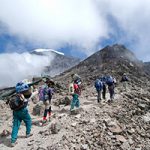Health & Vaccinations for Kilimanjaro
What are the required vaccinations for Kilimanjaro?
Part of planning your trek should involve doing some research in to what the recommended vaccinations for Kilimanjaro are and consulting your doctor for a health check.
All climbers should have a medical check prior to attempting the mountain. Ask your doctor if high altitude trekking is permissible for your age, fitness level and health condition. Ask if you have any preexisting medical conditions that can cause problems on the climb. Ask if any of your medications can affect altitude acclimatization. Ask whether Diamox can be taken with your existing prescription medicines.
Vaccination requirements for Tanzania change and it is important you visit your doctor or local travel clinic to discuss what vaccinations and drugs you require. There is also a risk of contracting Malaria while visiting Tanzania and precautions should be taken.
Recommended vaccinations for Kilimanjaro and Tanzania include:
Typhoid This disease is caught from contaminated food and water. A single injection lasts for three years.
Polio The polio vaccine used to be administered by sugar-lump, making it one of the more pleasant inoculations, though these days it’s more commonly injected. Lasts for ten years.
Hepatitis A This debilitating disease of the liver is spread by contaminated water, or even by using cutlery that has been washed in this water. The latest inoculation involves two injections; the first will protect you for three years, the second, taken six to twelve months later, will cover you for ten years.
Tetanus vaccinations last for ten years and are absolutely vital for visitors to Tanzania. The vaccination is usually given in combination with one for diphtheria. Once you’ve had five injections, you’re covered for life.
Meningococcal meningitis This disease of the brain is often fatal, though the vaccination, while not free, is safe, effective and lasts for three to five years.
Rabies If you’re spending some time with animals or in the wilderness, it’s also worth considering having a course of rabies injections, though it isn’t pleasant, consisting of three injections spread over one month.
Malaria
Malaria is always a serious disease and may be a deadly illness. Humans get malaria from the bite of a mosquito infected with the parasite. Your risk of malaria may be high in all countries in East Africa, including cities. All travelers to East Africa, including infants, children, and former residents of East Africa, may be at risk for malaria. Prevent this serious disease by seeing your health care provider for a prescription antimalarial drug and by protectingyourself against mosquito bites.
All travelers should take one of the following drugs:
- atovaquone/proguanil
- doxycycline
- mefloquine, or
- primaquine (in special circumstances).
Yellow Fever
If you are arriving directly in Tanzania it is not necessary. However, if you are arriving through a country that is subject to yellow fever you will need to be vaccinated. Stop overs where you do not leave the airport in a country affected should not require the vaccination.




















